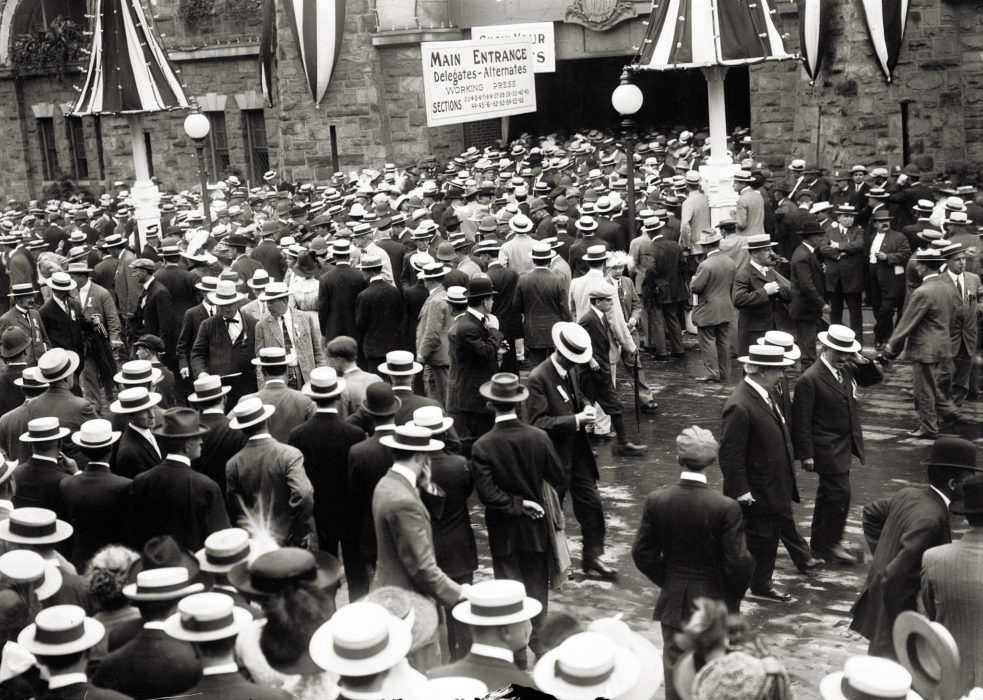EVERYBODY SEEMED TO BE in a hurry on Saturday, June 29, 1912. The rush began before dawn when a train left New York’s Pennsylvania Station, carrying a special overnight edition of the New York Times to the Democratic National Convention in Baltimore.
The delegates had been in session there since Tuesday, and by Friday evening the Times newsroom anticipated a decision before midnight. That would give them plenty of time to add the results to the regular Saturday morning edition before it had to go to press. But by 11 p.m. the delegates had already voted on twelve ballots without choosing a candidate. The deadline passed and the editor had to pull the trigger on the morning edition. So the Times ordered up a “Special” edition just for Baltimore. The convention adjourned at 3:05 a.m. on Saturday morning, the news arriving in New York by telegraph at 3:15. In a few minutes the presses in the basement of the Times building, at Broadway and Forty-third Street, were running off the special Baltimore edition. They loaded it onto wagons, clattered down Seventh Avenue, lowered the papers to the train level using the station elevator, and then pulled out of Penn Station at 4:17 a.m.
The New York Times wasn’t the only outlet pouring news into the convention. By Wednesday, 110,000 telegrams had already peppered the delegates, many of them sent by groups of voters back home. Exactly 1,128 of them were addressed to William Jennings Bryan, from 31,331 persons in forty-six states. Although Bryan had been a detached observer at the Republican Convention in Chicago, he was in the thick of things in Baltimore.

Bryan was a progressive, and, after running as the Democratic presidential nominee in 1896, 1900, and 1908, he still carried nationwide support. In 1906 he had traveled to Palestine and had visited ‘Abdu’l-Bahá in ‘Akká, writing about it in the Chicago Daily News. But this week “The Great Commoner” was all politics.
One thing had particularly riled him: the extent to which a few New York tycoons, such as J. P. Morgan, could shape the voting at both the Republican and the Democratic conventions. “It is a spectacle never before witnessed in American politics,” Bryan wrote. “Two conventions of opposing parties meeting within two weeks, and the same financial jugglers of Wall Street attempting to use the convention like the wooden figures in a Punch and Judy show.”
By this morning, Sunday, the delegates had voted on an additional fourteen ballots, and the New York Times printed the results of each vote on page two. Governor Woodrow Wilson of New Jersey was slowly breaking down the lead of the frontrunner, Champ Clark, the Speaker of the House.
There weren’t many stories in today’s Times that didn’t have to do with politics, but one of them was about ‘Abdu’l-Bahá. “PROPHET’S DASH FOR TRAIN: Abdul Baha in Spectacular Rush from Montclair” described the spectacle on Saturday morning at the Lackawanna station when his attendants had tried to stop the train from departing without him. ‘Abdu’l-Bahá was sandwiched between two Roosevelt stories on page six. The column to his left told how TR was gobbling up Republican newspaper endorsements. To his right Teddy chatted with reporters about Baltimore, his clothing still damp after a thunderstorm, which had narrowly missed ‘Abdu’l-Bahá’s unity feast in West Englewood, New Jersey, and had decided to wash out the Roosevelt family picnic in Oyster Bay instead.
“TIMES SPECIAL GOES 90 MILES AN HOUR,” the paper reported on page four. By the time the Special train reached Wilmington, Delaware, yesterday morning, it was eight minutes behind schedule. But the Engineer, Mr. Siter, kicked it into overdrive, covering 27.3 miles in 18.2 minutes. “The train fairly shot through space,” the paper said.
At 9 a.m. in Baltimore, a New York delegate spread out the Times Special on a restaurant breakfast table and began reading passages out loud, throwing in interjections of his own. “New York gives Clark its ninety votes. Announcement starts a big demonstration in the convention. Wilson men respond.”
“Say, this is right up to the minute, isn’t it? It’s the greatest thing in the world!”
In Tuesday’s feature, the outcome of the 1912 Democratic National Convention.






